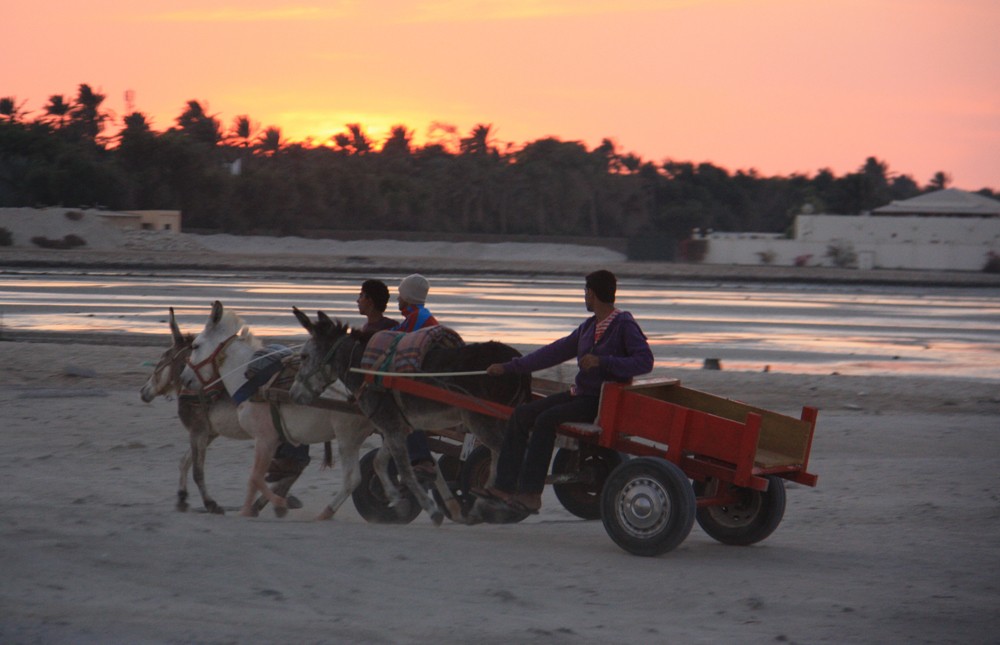
These carts provide for livelihoods of thousands of people in big cities like Karachi

It can take up to Rs 50,000 to set up a donkey-cart with an animal that has an average life span of eight to 10 years. Quite a hefty investment in the first go for people who use the carriage for business purposes, e.g., fruit and vegetable vendors, household trash pickers, and goods-carriers. But it’s still worth the money, since there are practically no running costs (e.g. fuel), save for the upkeep of the animal -- a solid diet and bi-annual visits to a veterinary doctor.
Abdul Shakoor, a fruit vendor who lives in Malir, says owning a donkey-cart is as good as owning a shop in Karachi. It’s mobile and you can carry a huge amount of goods around the city. "If I had to incur the fuel cost, it simply won’t be profitable," he says. He claims to make around fifteen to two thousand rupees a day.
Arguably the oldest mode of transport in the country, donkey-carts play an essential part in Karachi’s informal economy being a source of livelihood to thousands of people, especially from indigenous communities, like Sindhis and Baloch, who have traditionally been in the business.
In Karachi alone, there are around 80,000 donkey-carts plying the streets, estimates Syed Zulfiqar Shah, president Sindh Donkey Cart Association, a body that organises several inter-provincial and national donkey races, a much-liked traditional sport.
Despite the skyscrapers, gaudy giant billboards, and signal-free fast-lanes, the underbelly of Karachi is still very much glued to its roots as roughly half the population of the city still lives in informal settlements and donkeys are their choice of carriers because they are relatively cheap.
It is interesting to note that until the 1980s, donkey-carts were registered by Karachi’s metropolitan authorities to keep a count on the numbers plying Karachi’s roads, but for the past thirty years authorities have stopped keeping track of the vehicle.
"So, basically, there are no records, the estimates we have are based on our organisation’s survey conducted on the weekly transactions of donkey markets organised in Lyari and Malir," says Shah.
Donkey cart owners are mainly small entrepreneurs found in or around informal settlements or neighbourhoods known for having established cottage industries. Since that’s their market.
A cart being used strictly for transporting goods can make up to 2000 rupees or more in the old city area like Urdu Bazar or Orangi town of Karachi -- the hub of small industries often set up in households or shops.
Historically, certain professions in the city have conventionally used donkeys as their primary mode of business transport. For instance, there are hundreds of families in Malir and Dhobi Ghat areas of Karachi, who own donkey-carts to collect and deliver washable clothes to their clientele.
It is observed that small businesses that run operations on house-to-house model have traditionally used this mode of transport. The daily trash-pickers in Karachi, for example, own donkey-carts to carry out their services. For them, the advantages are very much evident because the travel cost is the cheapest when consolidated in life-cycle of donkey carts over the years.
"I call her my queen," says Mohammad Saddam, a trash-picker, who claims to transport around two hundred kilogrammes of household trash from over three dozen houses in Gulistan-e-Jauhar. "Donkey carts have always been used in our business, so we have a tradition of breeding donkeys as several members of my family are in this profession," he says.
Though he was reluctant to divulge how much he was making from the service, it is certain that he charges Rs 200 a month from each household to empty their trashcan. The vehicle is also used by small time water suppliers who put tankers on carts and deliver water in various neighborhoods during a water shortage.
Read also: Provincial concerns
Some donkey-cart owners complain of how the city’s traffic authorities treat them since they are not allowed to ply on major roads, such as Shahra-e-Faisal, and are forced to operate on the margins, which adds to their daily angst in running a business in Karachi’s cut-throat competitive environment. The rising number of motorbikes and cars also make their lives complicated as traffic congestion affects the health of the animals.
Mohammad Fakhre-Alam, a Malir-based donkey breeder, who also runs a laundry business, says the demand for donkeys has increased in the city as Karachi is spreading every day. "More people are coming to the city and the distances are growing, so the use of donkey as carriers has increased."
He claims that the donkey market in the city has seen a marked turnover in the past five years. "Apart from working as a carrier of cottage industries, donkey carts are also used by households to transport goods. It’s the poor people’s car," he says.
From shifting one’s house to carrying a daughter’s dowry, people use donkey-carts as the standard mode for heavy goods in poor neighbourhoods," he adds.